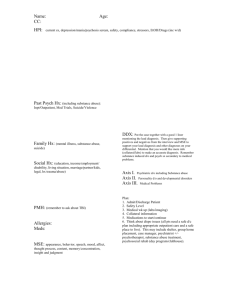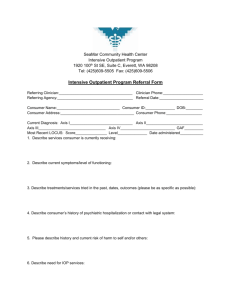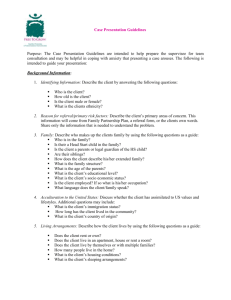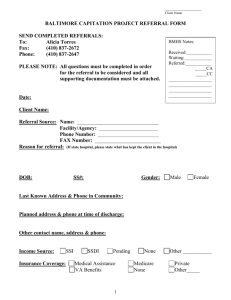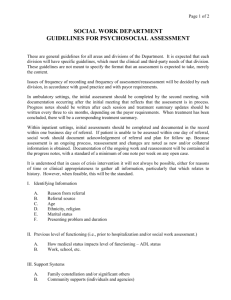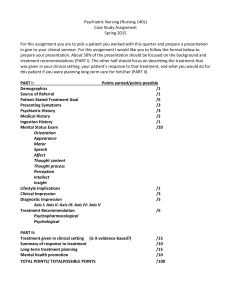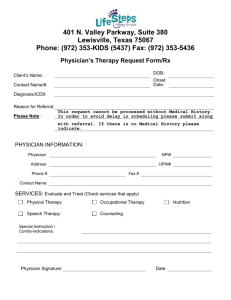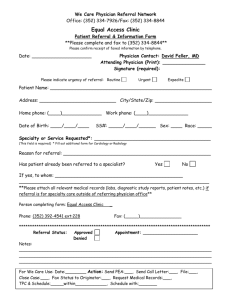Senior Outreach Program Intake Evaluation
advertisement
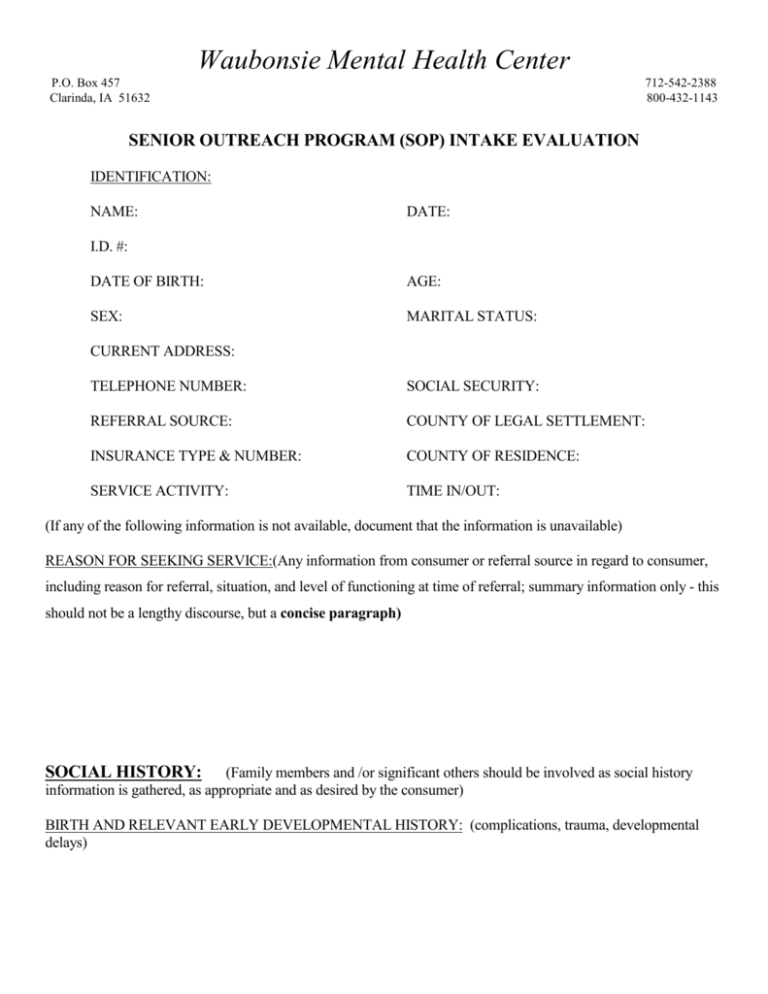
Waubonsie Mental Health Center P.O. Box 457 Clarinda, IA 51632 712-542-2388 800-432-1143 SENIOR OUTREACH PROGRAM (SOP) INTAKE EVALUATION IDENTIFICATION: NAME: DATE: I.D. #: DATE OF BIRTH: AGE: SEX: MARITAL STATUS: CURRENT ADDRESS: TELEPHONE NUMBER: SOCIAL SECURITY: REFERRAL SOURCE: COUNTY OF LEGAL SETTLEMENT: INSURANCE TYPE & NUMBER: COUNTY OF RESIDENCE: SERVICE ACTIVITY: TIME IN/OUT: (If any of the following information is not available, document that the information is unavailable) REASON FOR SEEKING SERVICE:(Any information from consumer or referral source in regard to consumer, including reason for referral, situation, and level of functioning at time of referral; summary information only - this should not be a lengthy discourse, but a concise paragraph) SOCIAL HISTORY: (Family members and /or significant others should be involved as social history information is gathered, as appropriate and as desired by the consumer) BIRTH AND RELEVANT EARLY DEVELOPMENTAL HISTORY: (complications, trauma, developmental delays) CHILDHOOD/ADOLESCENCE/with CULTURAL INFORMATION: (family of origin history, including history of any childhood abuse; adjustment/behavior problems; relationship to siblings/parents/peers; school and community activities as a child or teenager; any social, cultural and historical factors that impact on consumer's current level of functioning) MARITAL, FAMILY, & SIGNIFICANT SUPPORT SYSTEM HISTORY & RELATIONSHIPS with CULTURAL INFORMATION: (history of relationships and marriage(s), children born to the client; attitude toward current significant relationship; comment on any other support systems which are important to the client, including significant friendships; document any previous living relationships which have not been otherwise addressed; any significant social, cultural, and historical factors as an adult that impact on the client's current level of functioning, discuss the existence of or lack of natural supports) ENVIRONMENTAL HISTORY: (include information about past and current environmental issues, such as housing history, current and past living situations and conditions of living environment; history of evictions, etc.) EDUCATIONAL HISTORY: (highest level of education; grades in school; any special education classes, describe written and oral communication skills) TRANSPORTATION ISSUES: (describe how individual gets to various locations in community) WORK HISTORY: (job quits, firings, job satisfaction, job stress, any change in work performance) FINANCES: (source of income and how is it managed, issues related to meeting basic needs, list rent, utilities, public assistance benefits, etc.) SOCIAL FUNCTIONING: (community activities, religious affiliations, sports and recreational activities, hobbies and leisure time activities, etc.; other activities individual would like to be involved in, list barriers, if any) 533578623 2 ACTIVITIES OF DAILY LIVING: (list abilities and areas that need assistance in such areas as meal planning, meal preparation, housekeeping, hygiene, etc. Also address individual’s ability to access community resources) BEHAVIORAL HISTORY: (examples might include temperament, how the consumer gets along with others, problems with behavior that have not resulted in legal problems – are they pleasant, hot-tempered, etc.) LEGAL STATUS: (guardianship, conservatorship, or payee status; criminal or civil justice history, including current probation or parole; child abuse charges; child custody issues; mental health commitment history; if consumer is court-ordered or under guardianship, the Center should acquire a copy of the orders for the file) PHYSICAL HEALTH HISTORY: Name of Primary Care Physician: (Comment if consumer does or does not wish to have primary care physician notified of services with WMHC; if so, secure release of information to physician: Allergies to medication(s): Current and past drug therapies: (include medications now taking for mental and physical health problems, including dosages and frequency; note who is the prescribing physician; any past psychotropic medication therapies) Illnesses and current medical problems; physical complaints, hospitalizations, and surgeries) Sleep: (note nature of any sleep disturbance, including nightmares, hyper/hyposomnia) Appetite, history of eating disorder, any special diets: (note increased or decreased appetite; bingeing or purging) 533578623 3 Alcohol and drug use or abuse history: (include substances used and abused, including any prescription drugs abused; date of first use and last use; patterns of use, including amounts and frequency; include any current symptoms of abuse or dependency) Tobacco use: Caffeine use: MENTAL HEALTH HISTORY: (previous mental health/substance abuse treatment, couple counseling; inpatient and/or outpatient; list any hospitalizations, with date of most recent hospitalization and reason for hospitalization; list any current treatment with other treatment providers; any relevant evaluation activities including procedures and tests completed, and information provided from collateral sources, individual’s understand of their mental health needs, list any self-help techniques utilized by individual to manage the illness/symptoms - this can be summary information; note records which will be requested and not available at the time of this dictation) FAMILY HEALTH HISTORY: (significant history of mental and physical health problems of family members, including substance abuse history; be certain not to describe information that you may know about family members due to any treatment received at Center, only information directly from client during this interview) ASSESSMENT: MENTAL STATUS: (Include symptoms or disorders you will be addressing diagnostically on Axes I or II.) 1) Appearance & Behavior: Dress and Grooming: Posture/Gait; Physical Characteristics: Facial Expression/Eye Contact; Motor Activity: Specific Mannerisms: 2) Speech: (rate, pitch, volume, clarity, abnormalities) 3) Emotions: 533578623 4 Mood: (inward demonstration-client should be asked about his/her mood) Affect: (outward demonstration, variability, intensity, lability, flat, blunted, appropriateness) 4) Thought: Process: (flow of ideas, quality of associations) Content: Distortions: (delusions, ideas of reference, depersonalization) Preoccupations: (obsessions, phobias, compulsions, somatic concerns) Suicidal/homicidal thinking: (ideation, plan, means, attempts) 5) Perceptions: Illusions: Hallucinations: (auditory, visual) 6) Sensorium and Intellectual Functioning: Consciousness: Orientation: Concentration: Memory: (immediate/recent/remote) Fund of knowledge: Abstraction: Judgment: Insight: Attitude toward the interviewer: DIAGNOSTIC IMPRESSION: (Use DSM-IV codes and descriptions; on Axis I and II; if there is no diagnosis, use V71.09; if diagnosis is deferred, use 799.9. Axis I: (Clinical disorders; other conditions that may be a focus of clinical attention; list principal Dx (reason for visit) first in order, and any secondary Dx: 533578623 5 Axis II: (Personality Disorder; Mental Retardation; if an Axis II diagnosis is the focus of attention, list this as the principal diagnosis) Axis III: General Medical Conditions (if none present, list None) Axis IV: Psychosocial and Environmental Problems (note as many as are judged to be relevant) Axis V: Global Assessment of Functioning Current: Past Year: The following narrative assessment should include information and observations about the consumer's current situation, needs, problems, wants, abilities (strengths and assets) and desired results from seeking outpatient psychotherapy. Address the consumer’s perception of barriers, how the current situation that he/she is facing affects his/her ability to function on a daily level, and how he/she views that outpatient therapy will help achieve the desired result. Collateral provider information which should be solicited as appropriate to the individual situation in order to compile a full and comprehensive assessment should be noted. If this information is not available to the therapist as this assessment is completed, the therapist should secure a release(s) of information to gather additional information. If it is determined that further information for assessment and evaluation should be gathered through a referral process (psychiatric or psychological referral), this should be noted in the narrative, with arrangements made for the appropriate referral. If the consumer is developmentally disabled, information from the professional making this diagnosis should be documented and this information should be included in the consumer's record. The therapist should note, if it is determined at the time of this assessment, that the consumer will be appropriately treated through the outpatient psychotherapy and counseling service. It should be noted that these services will be provided with immediate admission to outpatient services. It should be made clear that the consumer is involved in this decision. List other agencies/individuals with whom the individual has been involved in this past year; or will likely be involved with in the future: AGENCY/INDIVIDUAL: DATE OF RELEASE: ________________________________________________ 533578623 6 Senior Outreach Specialist and Credentials ________________________________________________ Karen Davisson, LISW 533578623 7
